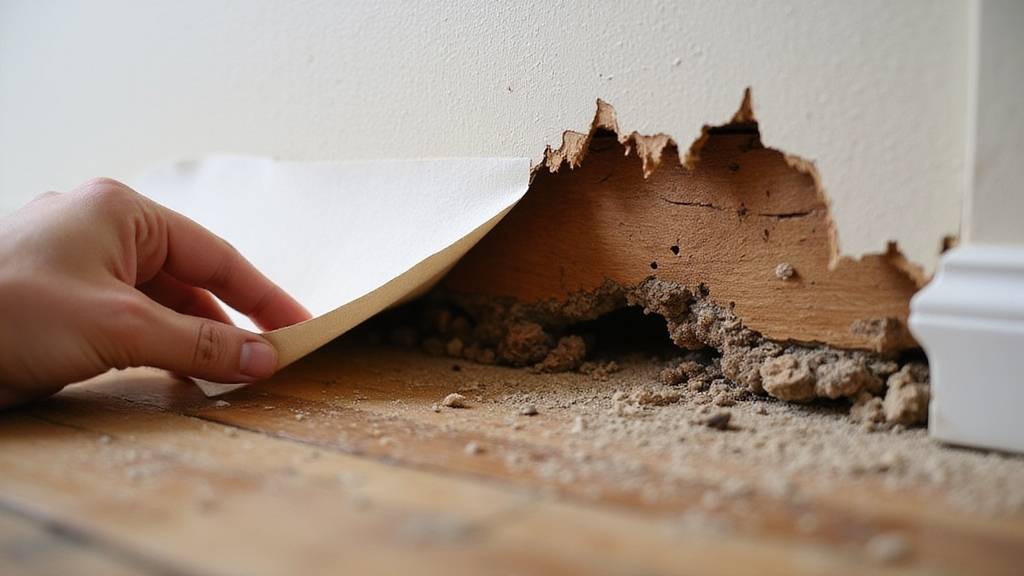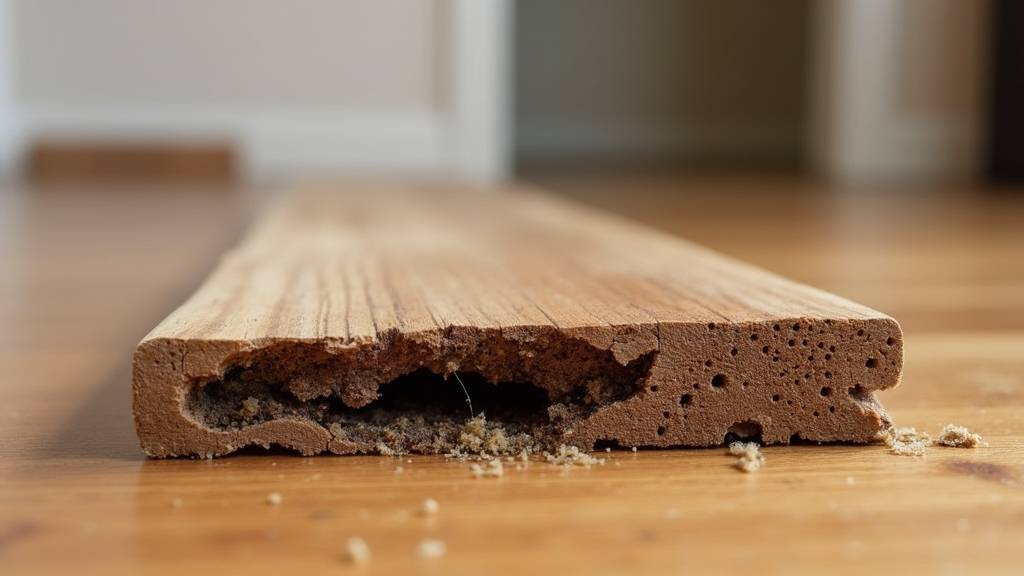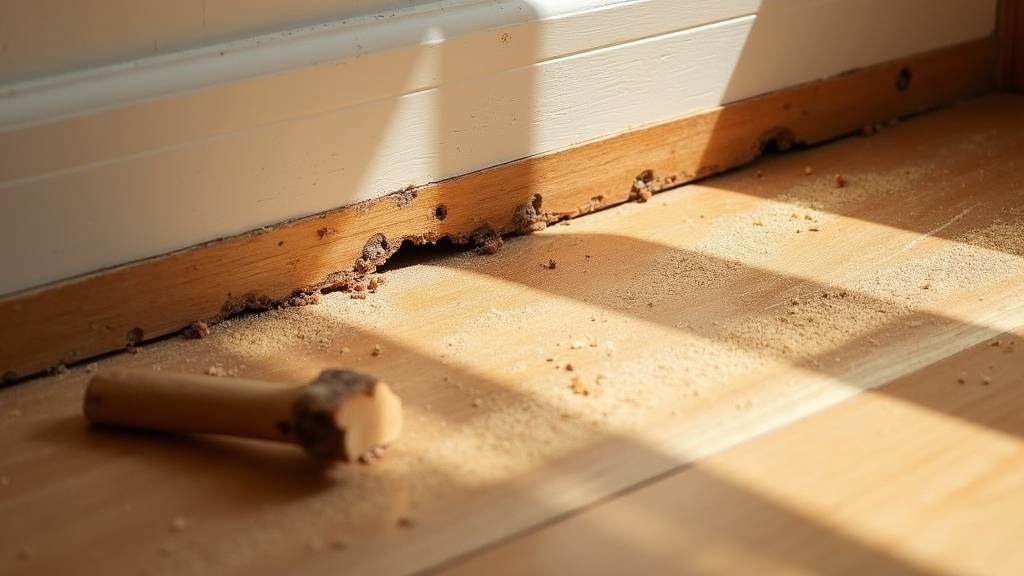Termite damage is a serious issue for many homeowners. When selling a house, hidden termite problems can create big headaches. Many sellers worry about what to do if they discover termites before listing their home.
Ignoring or hiding termite damage can hurt your sale. Buyers may back out, or you could face legal trouble later. The stress of possible lawsuits or canceled contracts adds to the problem.
The best way to handle this is to follow the rules for disclosure. You must always tell buyers about any known termite damage before selling your home.
This protects you and helps buyers trust your honesty. This blog will guide you step by step on how to properly disclose termite damage when selling your home.
Key Takeaways
- Accurately complete the required seller’s disclosure form, listing all known termite damage, infestations, and repairs.
- Provide buyers with all inspection reports, treatment records, and warranties related to termite issues.
- Clearly document and communicate any termite-related repairs or treatments performed on the property.
- Share ongoing pest control contracts or warranties and clarify if they are transferable to the new owner.
- Consult real estate professionals or attorneys to ensure disclosure complies with state and local laws.
Understanding Your Legal Obligations

You must tell buyers about any termite damage or infestations when selling your home. This is the law in most states. If you hide information, you could face fines or lawsuits. Proper legal disclosure also involves understanding and navigating title issues, such as liens or boundary disputes, to ensure a clear transfer of ownership.
Most states require a written statement about the home’s condition. This statement should mention any termite problems or repairs made because of termites. Buyers deserve to know this information.
If you are unsure about your state’s rules, check real estate laws or talk to a real estate agent. A qualified attorney can also help you understand your legal duties. Meeting these requirements protects you from legal trouble.
Recognizing Signs of Termite Damage
You must identify key indicators of termite activity, such as visible wood hollowing, the presence of mud tubes along foundations, and discarded wings found indoors. Recognizing these signs is essential for accurate disclosure and mitigation of future liability. Failing to observe and report these conditions can expose you to significant legal consequences during the transaction process.
Additionally, understanding building code violations related to pest infestations can help ensure compliance and prevent potential legal issues. Being aware of foundation damage signs caused by pests can further aid in comprehensive disclosure and repair planning.
Visible Wood Hollowing
Visible wood hollowing means termites have eaten wood from the inside, leaving the outside looking normal. Tapping on beams or baseboards can help you find hollow areas. If you hear a hollow sound or notice thin wood, there may be damage.
Use a flashlight and screwdriver to check suspect spots. If you find soft spots or empty spaces, termites might be present. These tools help you see hidden problems.
Homeowners must tell buyers about any termite damage they know about. If you do not report this, you could face legal trouble. Always keep records and consider hiring a professional for a full check.
Mud Tubes Presence
Mud tubes on a home’s foundation, walls, or crawl spaces are signs of termite activity. Subterranean termites build these tubes to travel between their nest and wood. If you see mud tubes, it usually means termites are or were present.
Mud tubes look like thin, dirt-colored tunnels about the size of a pencil. They can run along bricks, cement, or wood. These tubes help termites stay hidden and moist.
Homeowners must tell buyers if mud tubes are found. Mud tubes are clear evidence of termite problems and possible damage. If you do not report them, you could face legal trouble.
It is important to note where the mud tubes are located. You should inform your real estate agent about them. This will keep everyone informed and protect your legal rights.
Discarded Wings Indoors
Discarded termite wings indoors are a clear sign of recent termite swarming. These wings often mean termites have tried to start a colony inside. You might find them near windows, doors, or other openings.
If you see these wings, your property may have an active or past termite problem. Homeowners must report any termite evidence when selling a house. Not sharing this information can lead to legal trouble.
You should document where you find the wings. If you plan to sell, always tell buyers or inspectors about any termite signs. This helps protect you and keeps the process honest.
Assessing the Extent of the Infestation
To know how bad the termite problem is, check every area for signs of damage. Look for mud tubes, droppings, and wood that sounds hollow. These signs show where termites have been active. Inspect all areas for mud tubes, droppings, and hollow-sounding wood to spot where termites have been active.
Examine wood beams, baseboards, and crawl spaces for damage. If you see peeling paint or bent floors, hidden termites may be present. Decay in wood often means termites have been there for a long time.
If you find any signs, you must tell possible buyers. Accurate reports help you avoid legal trouble. Honest assessments also build trust with buyers. Knowing property condition disclosures is crucial to ensure compliance with Virginia law and to provide full transparency.
If you skip steps or hide problems, you could face lawsuits later. A clear report protects both you and the buyer. Always fully check and report the damage before selling. Additionally, understanding disclosure requirements helps ensure you meet legal obligations and maintain seller integrity.
Gathering Documentation and Inspection Reports

Gather all paperwork that shows the termite damage and repairs. Collect inspection reports from licensed pest control companies. These reports should include diagrams, photos, and written notes about the damage. Addressing issues like legal hurdles such as prior disclosures or liens can also be documented if relevant. Damage reports from contractors or inspectors must explain what repairs are needed or finished.
Keep receipts for all treatments, repairs, and follow-up checks. If buyers or authorities ask, these documents will prove the work was done. Well-organized records help you show honesty and avoid legal problems. Accurate reports are important if you must follow state laws. If you provide these records, buyers will trust your information. Additionally, verifying the lien history can prevent surprises during the sale process.
Consulting With a Real Estate Agent
Consulting with a real estate agent helps you disclose termite damage properly. An experienced agent ensures you meet legal rules and standards. Agents make the process easier and safer for you.
A real estate agent explains local laws and required forms. They help you use clear and correct language when reporting termite issues. If needed, agents can talk to inspectors to clarify the extent of damage.
An agent also guides you on how to answer buyers’ questions. They make sure you follow state and local disclosure regulations. If you use an agent, you lower your legal risk and build buyer trust.
Deciding What Needs to Be Disclosed

You must tell buyers about any known termite damage or past infestations. This includes anything that could affect the home’s value or safety. Each state has different disclosure rules, but honesty is always required. Full disclosure ensures transparency and helps prevent legal issues later. You should mention any visible damage or repairs caused by termites. If you have used pest control or taken steps to prevent termites, say so.
Buyers also need to know about ongoing prevention contracts. If you have had repeated termite problems, disclose this clearly. Include details about all professional pest control visits, even if the issue is fixed. Proper documentation and disclosure of legal obligations can protect you from future liability. Hiding information could lead to legal trouble or loss of a sale.
Filling Out the Seller’s Disclosure Form
You must fill out the seller’s disclosure form before listing your home. This form asks about the home’s condition and your knowledge of any issues. Accuracy and honesty are required by law.
If you know about termite damage or infestations, you must report them. Include details about any termite treatments or repairs you have made. List any warranties or pest control contracts you maintain.
Disclose the dates and results of termite inspections. Share any reports that mention past or current termite activity. Note any repairs made because of termites.
Describe any steps you have taken to prevent termites, such as soil treatments or regular inspections. If you have used professional pest control, list those services. Make sure you follow state disclosure rules and complete every section.
Proper disclosure helps prevent future legal issues and ensures transparency for buyers, especially since market conditions can influence the value and perception of the property. Additionally, understanding how to properly disclose property defects such as termite damage can significantly impact the speed and success of your sale.
Communicating With Potential Buyers
Direct communication with potential buyers is important after you finish the seller’s disclosure form. You need to share all known wood damage and explain the inspection process. This helps you follow the law and builds buyer trust. Proper documentation, including inspection reports and repair records, can also support your disclosures.
If a buyer’s agent asks questions, answer quickly with accurate and documented information. You should use clear language about the damage or any termite history. Never guess answers or hide facts.
Buyers often ask about the severity and location of wood damage. Give specific details about where the damage is and how bad it is. Always stay factual in your responses.
They may also want to know when and who did the inspection. You should provide the inspection dates and the inspector’s name or company. This shows transparency.
If buyers have questions about your legal duties, explain your state’s disclosure rules. Reference the law if needed. Being honest protects you from future problems. Knowing your obligations under disclosure laws is essential to ensure compliance and avoid potential legal issues. Being aware of property condition disclosure requirements helps prevent disputes and fosters trust during the sale.
Providing Repair and Treatment Records
Providing repair and treatment records helps buyers understand the termite history of your property. These records show what damage was found and how it was fixed. If you supply detailed documents, you meet legal rules and show you have cared for your home. Sharing detailed repair and treatment records assures buyers you’ve addressed termite issues and complied with all legal requirements.
Collecting comprehensive documentation also demonstrates your transparency in the sale process, which builds buyer confidence. Sellers should collect all receipts, inspection reports, and warranties from licensed pest control companies. These papers should cover termite inspections, treatments, and any repairs made. If you have warranties, include them for extra peace of mind.
Buyers will value seeing pest company reports, invoices for treatment, and proof of repairs. They may also want to see documents about wood replacement or added supports. If you have ongoing protection plans, share those details. Proper documentation can also help prevent hidden damage concerns from causing future disputes.
Clear records help prevent misunderstandings and protect you from future claims. Proper documentation makes the sale process smoother. If you are transparent, buyers will feel more confident in your property.
Addressing Buyer Concerns and Questions
You’ll likely encounter buyer objections regarding the extent and resolution of termite damage, so anticipate their questions with clear documentation. Provide comprehensive inspection reports to substantiate the property’s current condition. Explain the repair solutions implemented, emphasizing compliance with industry standards and legal disclosure requirements.
Common Buyer Objections
Buyers often worry about homes with termite damage. Their main concerns are repair costs, future infestations, and home value. They also want to know if all problems have been fixed.
Some buyers may ask about the termite prevention steps taken. Others will want details on past pest control treatments. They may also check if warranties or service contracts can transfer to them.
Buyers often question the extent of any damage. They may want proof of completed repairs from licensed professionals. If any infestations return, buyers will be concerned about possible extra costs.
Legal questions may come up about full disclosure of past termite issues. Buyers could ask if there are hidden problems not yet found. If everything is clear, buyers may feel more secure about their purchase.
Providing Inspection Reports
A recent termite inspection report helps address buyer concerns. It shows transparency and meets legal requirements. If buyers ask, you can show proof of inspection.
A licensed pest control professional should check the property. The report should list any termite activity and past treatments. It must also include advice for future prevention.
Always mention the inspection date in your documents. If the report covers all main areas, buyers will feel more confident. Providing this report can speed up negotiations and reduce future disputes.
Explaining Repair Solutions
Repair solutions for termite damage should be explained clearly. Buyers want to know what repairs were made and which areas were treated. If you provide this information simply, it builds trust.
A licensed contractor should list all structural repairs and materials used. Documentation must show which locations were treated for termite activity. If repairs were extensive, buyers need proof of what was fixed.
Details about termite baiting or monitoring systems should be included. If preventative barriers were installed, mention the types and locations. Always state if these measures protect against future infestations.
Warranties for repairs or treatments should be valid and transferable. If you have documents or guarantees, share them with buyers. Clear disclosure lowers risks and shows you followed legal rules.
Negotiating Repairs or Price Adjustments
When you tell buyers about termite damage, you must decide how to handle repairs or the sale price. You can lower the price, fix the problem before closing, or give credits at settlement. Buyers often want help with both fixing the damage and preventing more termites.
If you offer a home warranty for termites after closing, buyers may feel more comfortable. This can also help finish negotiations faster. Write down any agreements in the contract to follow state laws and avoid problems later.
You should talk to a real estate agent or lawyer during negotiations. They can help you follow local rules and protect your interests. Always check industry standards before making final decisions.
Working With Pest Control Professionals
Working with pest control professionals is important when selling a home with termite damage. A licensed expert helps with both finding and fixing the problem. They also help you meet legal rules for telling buyers about termites.
A pest control professional checks your home for termites and writes a full report. Their report shows if termites are active and how bad the damage is. If you need to treat the home, they make a plan and estimate the cost.
If you want to prevent future termites, the professional will give advice and tips. Some companies offer pest control warranties, which can be passed to new buyers. These warranties are helpful selling points.
If you work with professionals, you can be confident you meet all legal requirements. Their documents support your home sale and give buyers peace of mind. If you want to protect your interests, always choose a qualified pest control provider.
Preparing for the Home Inspection
A home inspector will check for any termite damage. You should fix any problems before the inspection takes place. If you do not, buyers may lose confidence or ask for repairs.
Homeowners must gather all records about termite control measures. These may include receipts for wood treatments or reports on bait stations. Make sure any warranties can be transferred to the new owner.
The property should be checked for signs of past termite infestations. If you see damage, repairs must meet current building standards. Full disclosure of all repairs and treatments is required by law.
If you provide clear information, buyers will feel more confident. Organized paperwork helps the inspection go smoothly. Being honest and prepared reduces your risk of future problems.
Ensuring a Smooth Closing Process
To ensure a smooth closing process, keep all termite-related records clear and easy to find. Buyers and agents will check these documents closely. Accurate information helps everyone feel confident about the sale.
All disclosure forms should follow state and local rules. Provide receipts for termite inspections and any repairs done. If a home warranty covers termites, share those details with the buyer.
If you have ongoing termite prevention or service contracts, include this information. Buyers may ask questions about past or current termite issues. Answer quickly to help prevent any delays in closing.
Conclusion
If you disclose termite damage honestly, you protect yourself from legal trouble and build trust with buyers. Full transparency gives everyone peace of mind during the sale. It also prevents misunderstandings that could delay or cancel the transaction.
If you want to sell your house quickly, we buy houses for cash in any condition. You do not have to worry about repairs or hidden issues. We handle the process so you can move on easily.
If you are ready to sell, reach out to Align Real Estate Solutions today. We can make a fair, no-obligation cash offer. Let us help you move forward with confidence.
Author
-

Zach Koops is co-founder and Real Estate Success Manager at Align Real Estate Solutions, serving homeowners across Virginia since 2024. With a passion for real estate and a heart for people, Zach has built his career around helping sellers navigate tough situations—foreclosure, inheritance, relocation, repair-overload—with clarity and compassion. He’s known for being straightforward, steady under pressure, and deeply invested in relationships. Outside of work, he spends his time as a husband and father, enjoys the outdoors in Shenandoah Valley, loves singing on stage, and constantly seeks growth through reading and new experiences.










